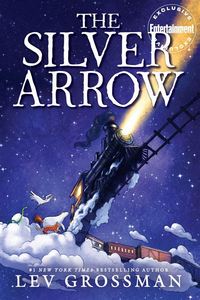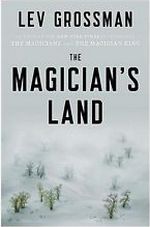 |
The Silver Arrowby Lev Grossman Hardcover, 259 pg. Read: December 3-4, 2020 |

You really don’t appreciate how incredibly colossal a steam locomotive is till one shows up parked on the street in front of your house. This one was about fifteen feet high and fifty feet long, and it had a headlight and a smokestack and a bell and a whole lot of pipes and pistons and rods and valve handles on it. The wheels alone were twice her height.
What’s The Silver Arrow About?
Kate lives a life that she doesn’t find that interesting. It involves a lot of reading (mostly books about science, or books where people discover that magic is real), wishing her parents would pay her more attention, or that something interesting would happen. I don’t think her younger brother, Tom, is any more satisfied, but he seems generally more upbeat. They have an uncle they’ve never met—because their parents describe him as irresponsible, but incredibly rich.
For her 11th birthday, Kate writes him a letter, asking for a present. What arrives is her uncle—who may be irresponsible, but he seems like a nice guy (even if her parents have a seemingly irrational amount of anger toward him) who arranges for a steam train, The Silver Arrow, to be delivered to her (and a small line of track installed in her backyard). While Kate and Tom climb all over it, her parents demand that Uncle Herbert remove the train. Before he can, it leaves with them on board.
Not only does it start by itself and travel through places it shouldn’t—the train communicates with the children. Before they know it, they’re at a hub where they add on passenger cars (among other things) and then start picking up passengers, all of whom are talking exotic animals (fully ticketed). Sure, by definition, a talking animal is fairly exotic, but I’m talking about things like a pangolin, a polar bear, a mamba, a fishing cat, and so on.
While they travel through the world (including many places that non-magical Steam Trains can’t go) the siblings have to overcome various challenges, defy the laws of physics (but never in a way that feels like violating physics), learn to work together, and learn a few lessons about some pretty heavy topics (in an entertaining and age-appropriate manner).
This really reminded me of…
Life always seemed so interesting in books, but then when you had to actually live it nothing all that interesting ever seemed to happen. And unlike in books, you couldn’t skip ahead past the boring parts.
The marketing for the book mentions both Roald Dahl and The Chronicles of Narnia. I honestly don’t remember the Dahl books I read in enough detail to comment on that—but it feels mostly okay. But Narnia? No. Sure, there were talking animals—but not that kind of Talking Beasts. Also, there’s no allegory at work here. That comparison didn’t work for me.
Julie Edwards’s The Last of the Really Great Whangdoodles came to mind while thinking about the book—the mix of science and magic, the way that adults talk frankly to children, the feel of the narration—all hearkened back to that for me.
But primarily, this reminded me of The Phantom Tollbooth—from the unexpected arrival of a magical form of transportation, to the encounters with strange realities, and lessons learned, the occasional feel of absurdity (that never feels absurd)…it speaks Tollbooth to me.
Neither of these books have the marketing pull of Dahl or Narnia, so I get why the Publisher went with the ones they went with, but it irks me that they were so far off.
The Things Beyond the Story
Deep in her heart Kate knew that. She knew that her problems weren’t real problems, at least not compared with the kinds of problems kids had in stories. She wasn’t being beaten, or starved, or forbidden to go to a royal ball, or sent into the woods by an evil stepparent to get eaten by wolves. She wasn’t even an orphan! Weirdly, Kate sometimes caught herself actually wishing she had a problem like that-a zombie apocalypse, or an ancient curse, or an alien invasion, anything really-so that she could be a hero and survive and triumph against all the odds and save everybody.
As Milo did in The Phantom Tollbooth, Kate (and, to a lesser extent, Tom) learn a lot from their travels and the atypical people they encounter. Some of the things I noted they experienced—and that young readers will encounter include maturity/embracing responsibility; engaging in life, not merely observing (via smartphone or books); animal preservation/conservation—notably of threatened or endangered species; and a strong hope in the future of and for Humanity. I don’t usually see the latter two themes paired together but I found Grossman’s use of the two to keep the book from being too heavy or too light.
This is a Book to Read Aloud
The best part of the book for me was Grossman’s use of language, his style, and voice. He sucked me in with the way he told the story before Kate and The Silver Arrow got their hooks in me. There’s a charm to the language that would attract (I can only imagine) middle-grade readers in a similar way that Norton Juster did me decades ago.
The other thing that kept coming to mind was just how fun this would be to read aloud to a kid of the right age. There are several lines that just beg to be hammed up while reading to a receptive third-grader, like:
 “Herbert,” he said. “What the blazes is this?” He didn’t really say blazes, but you can’t put the word he did say in a book for children.
“Herbert,” he said. “What the blazes is this?” He didn’t really say blazes, but you can’t put the word he did say in a book for children.
 [After several sentences of the mamba speaking full of “ssssss”s] (I’m not going to keep typing all the extra s’s, so just keep in mind that the snake hisses a lot when he talks.)
[After several sentences of the mamba speaking full of “ssssss”s] (I’m not going to keep typing all the extra s’s, so just keep in mind that the snake hisses a lot when he talks.)
 Weird how boys had feelings, too, but pretended they didn’t.
Weird how boys had feelings, too, but pretended they didn’t.
Those probably work better in context, but he breaks the fourth wall enough to add plenty of opportunities to have fun while you read it.
So, what did I think about The Silver Arrow?
She’d almost forgotten that the train could talk. There’s a lot going on in your life when you have more urgent things to think about than a talking train.
I think if I was about 40 years younger, I’d probably rate this at least 4 Stars, or maybe if I’d actually read it to someone, that might have done the trick. But I’m an old(er) crank and I could only imagine what it’d have been like to read to my kids.
This is a fun book, a kind of adventure that I’d want to give to kids, I’d want kids to be exposed to. And, yeah, it’s good for the inner child of older readers who like to remember how much fun certain books can be.

This post contains an affiliate link. If you purchase from it, I will get a small commission at no additional cost to you. As always, opinions are my own.
![]()



 Grab a book, any book.
Grab a book, any book.
